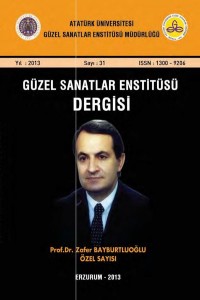Abstract
During the Islamic history, devoting the manuscripts of the Holy Quran, Holy Bukhari, Dalail al Khairat to a mosque, madrasah, dervish lodge by the sultans, viziers, eminent bureaucrats, wealthy people and princesses continued as a tradition. Today, the hand-written manuscripts of the Quran have been placed by the printed copies. The manuscript of the Quran, handwritten by Islamic calligrapher Dervish Hüseyin bin Mehmed under the patronage of Kerime Hatun, the daughter of Hacı Mehmed as being devoted to Kastamonu Kadı Nasrullah Mosque was completed in the year 1127/1715 according to its record of faragh. Dervish Hüseyin, one of the pupils of Hafiz Mehmed Kevkeb, who is the pupil of Hafiz Osman, has a considerably beautiful naskh calligraphy as a follower of the school of Hafiz Osman. The style of the structure of characters together with vowel points and decorative signs follow the style of Hafiz Osman, the master of his master. This unilluminated, leather bound manuscript of the Quran has been reached up to date without much disturbance.
References
- Akkanat, C. (2010). “Çok Katmanlı Bir Yapı: Kastamonu’da Nasrullah Camii”, Diyanet Dergisi, Ankara.
- Altıkulaç, T. (2007). Hz. Osman’a İzâfe Edilen Mushaf-ı Şerîf, İstanbul. Dere, Ö.F. (2009).Hattat Hâfız Osman Efendi, Korpus Kitap Sanat yayıncılık, İstanbul, Derman, U. (1994). “Dervi ş Mehmed Kevkeb Efendi”, DİA, IX, İstanbul, 19
- Doksan Dokuz İstanbul Mushafı, İstanbul, 2010.
- Habib, Hat ve Hattâtân, Kostantiniyye, 1305.
- Müstakimzade Süleyman Sadeddin Efendi, ( 1928). Tuhfe-i Hattâtîn, İstanbul.
- Kanba ş, Mahmut Sami, Geçmişten Günümüze Mushaf-ı Şerîf, İstanbul. Rado, Ş. Türk Hattatları, İstanbul. Serin, M.( 2010). Hat Sanatı ve Me şhur Hattatlar, İstanbul.
- Seymen, L. (2009). Üsküdar’a Kadar Kastamonu, YKY., İstanbul.
Abstract
İslâm tarihi boyunca sultanlar, vezirler, devletin ileri gelenleri,
varlıklı kişiler ve hanım sultanlar tarafından cami, medrese, tekke ve benzeri
yerlere Kur’ân-ı Kerim, Buhari-i Şerîf, Delâilü’l-Hayrât vakfedilmesi
geleneğini süregelmiştir. Günümüzde ise el yazma Kur’ân-ı Kerim’lerin
yerini matbuları almıştır. Kastamonu Kadı Nasrullah Camii’ne vakfedilmek
üzere Hacı Mehmed kızı Kerime Hatun tarafından Hattat Derviş Hüseyin bin
Mehmed’e yazdırılan Kur’ân-ı Kerim, ferağ kaydından anlaşıldığına göre
1127/1715 tarihlidir. Hafız Osman’ın talebesi Hâfız Mehmed Kevkeb’in
talebelerinden olan Derviş Hüseyin, Hafız Osman mektebinin takipçisi olarak
oldukça güzel bir nesih yazıya sahiptir. Harflerin bünyeleriyle birlikte hareke
ve tezyînî işaretler hocasının hocası olan Hâfız Osman tarzındadır. Tezhipsiz,
deri ciltli olan Kur’ân-ı Kerim günümüze kadar yıpranma ve parçalanma
olmadan gelmiştir.
Anahtar Kelimeler: Hattat, Derviş Hüseyin, Kevkeb Mehmed Efendi,
Kastamonu.
A Student of Hattat Kevkeb Mehmet Efendi A Qur’an which
Belongs to Hattat Derviş Hüseyin Efendi
Abstract
During the Islamic history, devoting the manuscripts of the Holy
Quran, Holy Bukhari, Dalail al Khairat to a mosque, madrasah, dervish lodge
by the sultans, viziers, eminent bureaucrats, wealthy people and princesses
continued as a tradition. Today, the hand-written manuscripts of the Quran
have been placed by the printed copies.
The manuscript of the Quran, handwritten by Islamic calligrapher
Dervish Hüseyin bin Mehmed under the patronage of Kerime Hatun, the
daughter of Hacı Mehmed as being devoted to Kastamonu Kadı Nasrullah
Mosque was completed in the year 1127/1715 according to its record of
faragh. Dervish Hüseyin, one of the pupils of Hafiz Mehmed Kevkeb, who is
the pupil of Hafiz Osman, has a considerably beautiful naskh calligraphy as a
follower of the school of Hafiz Osman. The style of the structure of
characters together with vowel points and decorative signs follow the style of
Hafiz Osman, the master of his master. This unilluminated, leather bound
manuscript of the Quran has been reached up to date without much
disturbance.
Keywords: Calligrapher, Darwish Hussein, Kevkeb Mehmed Efendi,
Kastamonu.
Keywords
References
- Akkanat, C. (2010). “Çok Katmanlı Bir Yapı: Kastamonu’da Nasrullah Camii”, Diyanet Dergisi, Ankara.
- Altıkulaç, T. (2007). Hz. Osman’a İzâfe Edilen Mushaf-ı Şerîf, İstanbul. Dere, Ö.F. (2009).Hattat Hâfız Osman Efendi, Korpus Kitap Sanat yayıncılık, İstanbul, Derman, U. (1994). “Dervi ş Mehmed Kevkeb Efendi”, DİA, IX, İstanbul, 19
- Doksan Dokuz İstanbul Mushafı, İstanbul, 2010.
- Habib, Hat ve Hattâtân, Kostantiniyye, 1305.
- Müstakimzade Süleyman Sadeddin Efendi, ( 1928). Tuhfe-i Hattâtîn, İstanbul.
- Kanba ş, Mahmut Sami, Geçmişten Günümüze Mushaf-ı Şerîf, İstanbul. Rado, Ş. Türk Hattatları, İstanbul. Serin, M.( 2010). Hat Sanatı ve Me şhur Hattatlar, İstanbul.
- Seymen, L. (2009). Üsküdar’a Kadar Kastamonu, YKY., İstanbul.
Details
| Primary Language | tr;en |
|---|---|
| Journal Section | Articles |
| Authors | |
| Publication Date | May 2, 2014 |
| Submission Date | May 2, 2014 |
| Published in Issue | Year 2013 Issue: 31 |
Etik kurallarla ilgili maddelerin uygulanması konusunda etik kurul izni gerektiren çalışmalar için izinlerin alınıp, izinle ilgili bilgilere makalede yer verilmesi hususu kriterlere eklenmiştir. Bu doğrultuda dergimize gönderilen ve aşağıda belirtilen koşullara uyan makaleler için Etik Kurul İzni alınması gerekmektedir.
• Anket, mülakat, odak grup çalışması, gözlem, deney, görüşme teknikleri kullanılarak katılımcılardan veri toplanmasını gerektiren nitel ya da nicel yaklaşımlarla yürütülen her türlü araştırmalar.
Ayrıca;
• Başkalarına ait ölçek, anket, fotoğrafların kullanımı için sahiplerinden izin alınması ve belirtilmesi,
• Kullanılan fikir ve sanat eserleri için telif hakları düzenlemelerine uyulduğunun belirtilmesi gerekmektedir.


